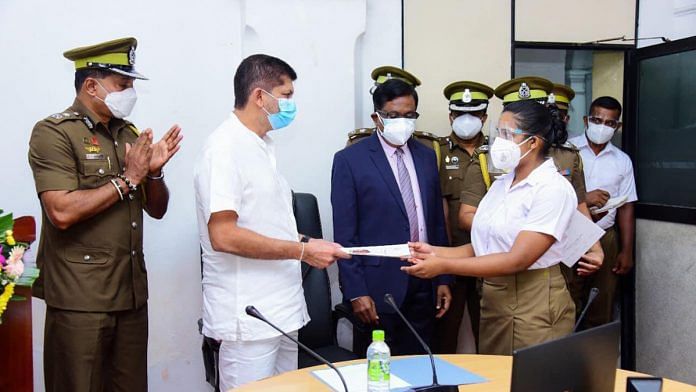New Delhi: Lohan Ratwatte, the minister in charge of Sri Lanka’s prisons, who has been under fire for allegedly threatening to kill two Tamil prisoners, resigned Wednesday.
Ratwatte was accused this month of entering the Anuradhapura and Welikada Prisons while drunk and forcing inmates, held on charges of being associated with the Tamil Tigers or the Liberation Tigers of Tamil Eelam (LTTE), to kneel at gunpoint.
Ratwatte acknowledged his responsibility for the incidents that took place at the prisons, according to a statement from the president’s office. In his resignation letter, he, however, did not confirm the allegations. “I resign as I do not want to cause embarrassment to the government in view of the media reports,” the letter said.
Besides, the State Minister of Prison Management and Prisoners’ Rehabilitation portfolio — since December 2020 — Ratwatte is also State Minister of Gem and Jewellery Related Industries, a post he still holds.
His resignation, the result of a sustained campaign by activists and opposition parties demanding his removal over the alleged unruly conduct at the prisons, however also comes at a time when Sri Lanka’s human rights track record is under the United Nation’s scanner.
Earlier this week, United Nations High Commissioner for Human Rights, Michelle Bachelet, called for “close attention” to the island nation’s human rights record. Bachelet had said she looks forward to “concrete actions” from the ruling Rajapaksa government — a decade after the country witnessed a bloody civil war that led to at least 40,000 civilian deaths.
In February this year, Sri Lankan President Gotabaya Rajapaksa reportedly wrote to Prime Minister Modi, seeking support ahead of the United Nations Human Rights Council (UNHRC) session. India eventually abstained from a crucial vote on the country’s rights record at the UNHCR in Geneva.
‘Degrading treatment of PTA detainees’
According to Senaka Perera, the head of the Committee for Protecting Rights of Prisoners advocacy group, Ratwatte arrived at the Welikada Prison while intoxicated on 6 September and to the Anuradhapura prison on 12 September in the same condition.
A fallout of the minister’s alleged misconduct has brought Sri Lanka’s controversial anti-terrorism law, Prevention of Terrorism Act (PTA), back into focus.
On Wednesday, Yamini Sharma, Asia-Pacific Director of UK-based Amnesty International said: “These dumbfounding reports go to show that our ongoing concerns regarding Sri Lanka’s treatment of prisoners, especially the authorities’ torture and other inhumane and degrading treatment of PTA detainees are all too valid.”
The PTA, introduced as a temporary measure in 1978, gives security forces in Sri Lanka sweeping powers to arrest and detain suspects.
In the past, it has been criticised by the international community, human rights activists and the UN Special Rapporteurs.
In June this year, the European Parliament noted that the PTA contains “deeply flawed provisions” such as enabling warrantless arrests and 18-month detentions with “limited court oversight”.
By 10 June, the European Parliament had adopted a resolution that called for the repeal of Sri Lanka’s PTA and consideration to temporarily withdraw its access to GSP+ (Generalised Scheme of Preferences Plus), part of EU’s unilateral tariff preferences in favour of developing countries.
Amnesty International further criticised the Sri Lankan president’s recent pardon of 16 men linked to the Tamil Tiger rebels in late June this year, calling it part of “piecemeal efforts” to address the conditions of PTA prisoners.
(Edited by Paramita Ghosh)
Also read: Sri Lanka’s economic crisis worsened by hit to tea crop, could seek India help



